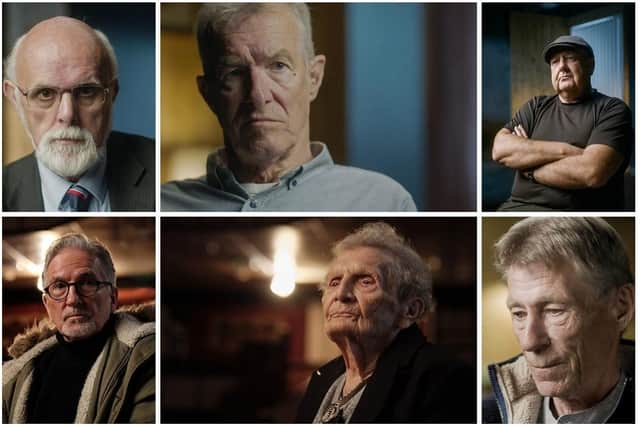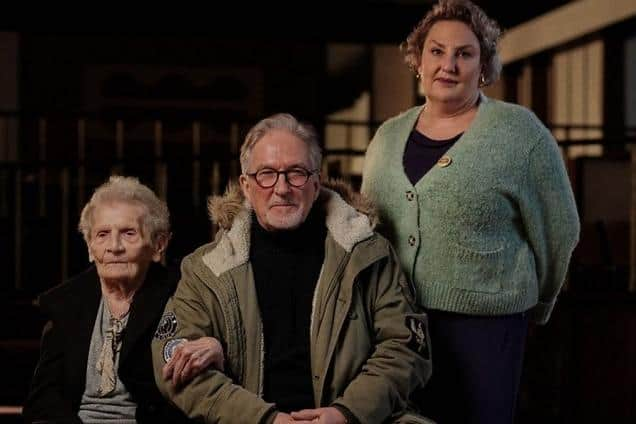Miners' Strike: A Frontline Story: BBC documentary to explore stories of Yorkshire miners in South Yorkshire through miners, their families, police and organisers 40 years on
Miners’ Strike: A Frontline Story is a 90-minute documentary that brings together powerful archive footage featuring deeply personal stories from 15 men and women on the frontline of the strike.
This year marks the 40th anniversary of the Miners’ Strike and with honesty, many who were involved are speaking about their experiences for the first time to explore one of the most divisive conflicts in a generation.
Advertisement
Hide AdAdvertisement
Hide AdThe strike started in March 1984; The Orgreave Coking Works, where coal was converted into coke for use in steel production, was considered by the National Union of Mineworkers (NUM) leader Arthur Scargill as critical.


Ben Anthony is a multi-BAFTA Award winning documentary and drama director, known for a sensitive approach to powerful human stories.
Zac Beattie is also a multi-BAFTA Award winning executive producer responsible for ambitious documentary films and series including Our Falklands War: A Frontline Story, Gun No. 6 and 24 Hours in Police Custody.
Ben Anthony said: “I’d hope people will think of the miners’ strike as a pivotal moment in our collective history that, for better or worse, helped shape the country we live in.
Advertisement
Hide AdAdvertisement
Hide Ad“In today’s world, where acts of principle - especially among our political class – seem increasingly uncommon, I’d also like people to remember a time when people were prepared to stand up and make sacrifices for something they felt was important. Even if the outcome wasn’t what they wanted.”


Zac Beattie said: “We had all heard about the hardship and sacrifices faced by striking miners, who went a year without wages, and relied on union funds, donations and the resourcefulness of community soup kitchens – even picking veg by night from farmer’s fields.
“But we were all very affected by a miner who was not able to pay for a funeral for his child who died during the strike and what that meant for him and his wife. Despite this and other very challenging personal circumstances he remained on strike without income for the whole year.
“Whatever your views of the strike, whatever your political views, it’s hard not to be moved in this day and age by what people were prepared to sacrifice for something they believed in. I was also surprised by the level of very real fear that was felt at various points throughout the year, by those miners who chose to continue to work, or chose to go back work.
Advertisement
Hide AdAdvertisement
Hide Ad“One miner who broke the strike in Yorkshire talked about feeling the need to keep a pickaxe handle on the passenger seat of his car from that day on.”
Miners’ Strike: A Frontline Story will be available to watch on BBC Two and BBC iPlayer produced by The Garden, part of ITV Studios.
Nine Yorkshire stories on Miners’ Strike: A Frontline Story
Brenda Boyle
Brenda was a community organiser, soup kitchen volunteer and mother to four South Yorkshire striking miners.
She married a miner and had five sons; the first four went down the pit whilst the youngest was at school.
Advertisement
Hide AdAdvertisement
Hide AdHer four sons were arrested and sent to prison during the strike, for shouting “scab” outside the house of a local strike-breaking miner. She is now aged 87 and ready to tell her story.
“I have a story to tell,” she said.
“There are no mines left. The industry has vanished. The younger generation don’t even know what a miner is.
“I want it to be an education for a lot of people. Mining is part of our history and it’s never going to come back.”
Bruce Wilson
Bruce was a striking miner and flying picket from South Yorkshire.
Advertisement
Hide AdAdvertisement
Hide AdDuring the strike, he was a 29-year-old man with two young children.
He was a very active picket and he would squeeze himself into his Triumph 2.5 along with his brother and three friends to try and beat the police blockades, to go picketing in Nottinghamshire and Derbyshire.
“For the last 40 years all I’ve wanted is the truth to be told: ‘Our side of the story’,” he said.
“What they [Margaret Thatcher, the Tories and the establishment] did and tried to do to striking miners, their wives and families.
Advertisement
Hide AdAdvertisement
Hide Ad“The injustices and hardships endured by striking miners and their families. Fighting not just for their communities and jobs, but for their mates’ jobs and communities down the road.”
David Nixon
David was a striking miner and flying picket from South Yorkshire.
He got signed up by the NUM as soon as he joined Hatfield and he was a very active picket. He witnessed the death of a young miner at Ollerton, amidst violence between Yorkshire and Nottinghamshire miners.
“I was proud to be part of one of those rare historical events whereby thousands of common folk throughout the UK challenged a government who had no compassion or affinity to ordinary working people,” he said.
Advertisement
Hide AdAdvertisement
Hide Ad“Sadly, with the passing of time, those memories will fade and it is important for not just my children's children but everyone's next generation to know and understand 'why' we stood up and fought.
“My memories of the strike are those of an explosion of humour and passion, interspersed with anger and determination.
“A memory that is ingrained into every sinew of my body, mind and existence. It is the only year that I can fully remember where I was and what I did.”
Dave Roper
Dave was a striking miner and flying picket from South Yorkshire.
Advertisement
Hide AdAdvertisement
Hide AdHe was a young man when the strike began, married with a child and another on the way.
He believed that miners were going to win the fight and the loss of earnings that accompanied the year-long strike meant that Dave was faced with some very difficult personal circumstances, when he lost his newborn child.
“Everyone has a tale to tell from the miners’ strike, having experienced police brutality on a scale I could never have imagined,” he said.
“I felt it was important I give my recollections of the strike. Of course there was not just police brutality, there was hardship on a scale unknown, state propaganda, relationship and family breakups.
Advertisement
Hide AdAdvertisement
Hide Ad“And also a strong sense of togetherness from the people who believed in the strike. Do I have any regrets? I only have to take a look around my community and the communities in South Yorkshire to know I was 100% right.”
Don Keating
Don was a striking miner from South Yorkshire.
He was a former grenadier guard in Northern Ireland with direct experience of the conflict and disorder.
His life changes when he meets Jackie and leaves the forces to become a coal miner and is immediately in support of the strike but chooses to stay at home getting extra shifts as a fireman.
When stories of violence on the picket line come pouring in, he can’t believe it - he has always learnt to trust and respect the police - so he goes to the mass gathering of miners at Orgreave to see for himself and ends up in police custody.
Advertisement
Hide AdAdvertisement
Hide Ad“The 12-month miners’ strike was 40 years ago and nothing I say now can alter the outcome… we lost!” he said.
“But I want people to remember that we fought long and hard, gave our very soul to a cause we genuinely believed was just.
“We took on the might of the ‘State’ i.e. Thatcher, The Police and the Scab element of our once proud industry. I’m so proud I did what I did and stuck to my principles and backed my union. I can, to this very day walk with my head held high, and yes, I would do it all again.
“Why now? We’ve lost thousands of our ex-mining colleagues since the 84/85 miners’ strike, there are not many of us left that fought the good fight for 12 gruelling months without turning ‘scab’ and consequently stabbing their own work mates in the back.
Advertisement
Hide AdAdvertisement
Hide Ad“So let’s make these documentaries, write these newspaper articles for our future generations to read while we still have individuals who experienced the event first hand because the next time the media will show an interest will be at the 50-year mark, and Lord knows how many good men and true will no longer be with us. RIP.”
Geoff
Geoff was a ‘strike breaker’ from South Yorkshire.
He decided to break the strike in South Yorkshire, which was the centre of the miners’ strike. He always felt that striking was a waste of time, but felt had no choice but to join the majority.
But, after nine months, he’d had enough and wanted to go back to work. He was one of six strike breakers to go back to work at Wath Main in November 1984, under a hail of bricks and faeces.
From that day on, he feared reprisals and kept a pickaxe handle on the passenger seat of his car.
“We made history. I wanted to put my side down. That’s it.”
Jackie Keating
Advertisement
Hide AdAdvertisement
Hide AdJackie is the spokesperson and wife of a striking miner from South Yorkshire.
She lives with her husband Don Keating and they have two children. When the strike began, she wanted to do her bit and get involved in rallies and fundraisers.
At odds with the distrust her husband Don and other miners feel towards the media, she put herself forward for news interviews to try and counter what she feels is negative press for the striking miners.
“40 years ago, I wanted the country to know the truth behind the newspaper headlines and TV perceptions,” she said.
Advertisement
Hide AdAdvertisement
Hide Ad“Many of the interactions are still vivid in my mind. The good, also of the awful betrayal and bad representation of the miners’ families. 40 years on, that is still my aim. The real truth!”
Paul Brown
Paul was a mounted police officer from South Yorkshire Police.
He worked for South Yorkshire Police from 1973 and joined the mounted police in 1981.
He was at Orgreave on horseback and he was at the front of the mounted officers who were ordered to charge at the miners.
Advertisement
Hide AdAdvertisement
Hide Ad“The strike didn’t impact me in the same way that it did the striking miners and their families,” he said.
“However, taking part in this documentary has made me think again about the significance of events that took place 40 years ago, especially since I was raised in a mining community myself.”
Russell Broomhead
Russell was a striking miner from South Yorkshire.
He was a striking miner who was bludgeoned by a police officer using his truncheon at the so-called Battle of Orgreave, before being arrested and charged with ‘riot’.
Russell has spent a lot of time overcoming the trauma of the incident and his wrongful arrest - he was later acquitted and paid compensation, when police were found to have falsified evidence.
Advertisement
Hide AdAdvertisement
Hide Ad“I have taken part in loads of documentaries about June 18 1984, it seems blindingly obvious that South Yorkshire police believed they were above the law and continued in the same way for a number of years (Hillsborough),” he said.
“I’ve always tried to put my point over that it was a set-up engineered from the very top of government in the hope that eventually, there will be a public enquiry.”
Comment Guidelines
National World encourages reader discussion on our stories. User feedback, insights and back-and-forth exchanges add a rich layer of context to reporting. Please review our Community Guidelines before commenting.
